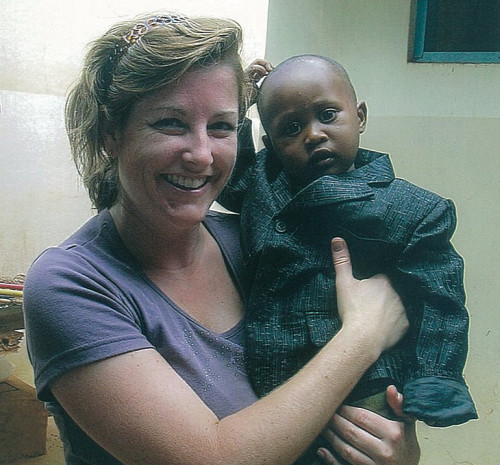SHEGUIANDAH—After raising $5,237, travelling over 12,400 kilometers and spending 16 days in Moshi, Tanzania helping deliver medical attention, Chrissy Wade has returned home to Manitoulin, bringing with her a story of selflessness and grace.
“When I was sitting on the plane waiting to take off in Sudbury I thought to myself, ‘how do I feel’?” reflected Ms. Wade when she sat down with The Expositor last week. “I had been really sick leading up to the flight and had to push off leaving until I was better on the Monday (two days later than planned). Instead of flying out with another member of the team and meeting up with the rest of our group in Amsterdam, I was on my own the whole time. I wasn’t nervous, I was excited.”
Ms. Wade had every reason to be excited. The medical mission was something that she had worked very hard for and been wanting to do for as long as she could remember.
“I have always wanted to travel to a third-world country and help people in need,” explained Ms. Wade prior to her trip. “We are so lucky here that we have freedom, fresh water, education and free healthcare.”
Ms. Wade heard about the program Canada Africa Community Health Alliance (CACHA) from Dr. Leigh Davis who, in addition to practicing on Manitoulin, is currently on her second mission to Tanzania with CACHA.
After learning of the CACHA—a program started at the University of Ottawa in 2001 in response to Africa’s urgent need for help—Ms. Wade began fundraising and gathering supplies to volunteer with CACHA.
A requirement of volunteering with CACHA is that participants must raise $4,700 towards the organization to help with the program and cover flight costs.
Manitoulin opened their hearts and chequebooks to Ms. Wade, and thanks to her determination and the Island’s generosity, Ms. Wade was able to raise $5,237, $537 more than required. She also collected a number of dental and medical supplies, in addition to stationary, shoes, books and toys.
Ms. Wade flew into Tanzania by herself, slightly anxious about customs and her five pieces of luggage containing the wide variety of donated supplies.
“Thank goodness customs wasn’t a problem,” said a relieved Ms. Wade. “I was a little worried about all the luggage, but I cleared customs without any problems.”
From the airport, Ms. Wade was picked up by a local member of CACHA who she said the team affectionately refereed to as ‘Poppy.’ Poppy took Ms. Wade to a guesthouse in the town of Moshi, where she and a group of 20 volunteers were staying. Among Ms. Wade’s group were pharmacists, surgeons, nurses, physicians and logisticians who would work together with local staff to provide general medicine consults, OB/GYN consults, minor surgery, HIV testing and dentistry to community members. The group was based out of Pamoya Tunaweza Women’s Centre in Moshi, but travelled daily with a caravan to neighbouring communities delivering medical aid.
“Dr. Davis was among the group that welcomed me at our guesthouse,” explained Ms. Wade. “It was nice to see a friendly face. Everyone was very nice and it was a welcoming environment. Members of the group were very surprised and excited by all the supplies. They were so grateful to my community for their generosity.”
Ms. Wade said she awoke the next morning ready to get to work, but a couple of the doctors and local members of CACHA wanted to immerse Ms. Wade with the local culture before she begin working with its people. She said they took her to the market in Moshi.
“It was a bit of a culture shock,” explained Ms. Wade. “I didn’t know what to expect. There were so many new smells and a lot of people, but everyone was so friendly. I felt at ease.”
Ms. Wade said after the market, they visited the ‘dawa,’ meaning pharmacy, to pick up prescriptions and then joined the rest of the team and caravan at a local village.
“It was pretty interesting,” said Ms. Wade. “There were just so many people waiting, many of whom I learned had walked hours and hours to get there. There were hundreds and hundreds waiting patiently all day long, praying to be the lucky ones to get a yellow medical form which ensured they would received medical attention.”
Ms. Wade was informed that she could just observe until she felt comfortable, but seeing the need, she jumped in right away and began weighing patients.
With a background as a dental assistant and medical admitting clerk, she provided logistical support, helped set up the clinics, triage, controlled lines and counted pills.
“The first day was great because we landed up almost everyone, but this was not normally the case,” said Ms. Wade.
She described another day with the caravan when she was asked to hand out the last ten yellow medical forms to the most ‘in need’ individuals.
“I said no problem. I’d love to, but then I saw everyone waiting,” said Ms. Wade. “They saw the forms in my hand and they knew where to direct their attention. As I was approaching the crowd, they started walking towards me and I ended up in the middle of the remaining people that were desperate for medical treatment. Their eyes were full of apprehension and anxiety to see who would be chosen to receive the last medical treatment of that day. The yellow forms were like winning a lottery and an answer to their prayers. I tried handing out the yellow forms over my head to the people that I felt should not be turned way. They were grabbing at the forms and begging me for them. There was so much despair and worry in their eyes. It broke my heart to see this and I had to ask the translator, Dialo, to help determine who was in the most need of help.”
Ms. Wade said she felt terrible watching people leave that could not receive help, even thougt she and her team had attended as many people as they could. Although there were many days when the team had to turn patients away due to a shortage of volunteers, medical supplies and funds, during Ms. Wade’s 16 days with the team they treated over 2,000 sick individuals throughout the area.
During her trip, Ms. Wade also had the opportunity to visit local orphanages where she was able to surprise and delight the children there with some of Manitoulin’s donated items.
“We drove out into the forest, into the middle of nowhere,” began Ms. Wade. “After driving down this long dirt road, we came upon a small building where children came running out to great us. Many of them didn’t have shoes or were not fully clothed, but I was surprised that some greeted us in English. I was informed that some of the children were sponsored to attend school. Being sponsored means that the child received a school uniform, was taught English and received school meals.”
She said that despite the woman who ran the orphanage’s best efforts and sponsor funds, the children still slept three to a small mat of the floor.
“The children at the orphanage and in the villages we travelled to were so grateful for a toothbrush, a pencil or even a sticker,” said Ms. Wade. “The ‘mother’ of the orphanage cried when I gave her a bottle of glue. She said she was so excited at all the crafts she could now do with the children. It was heartbreaking.”
Ms. Wade said she was in awe of the hard work and patience of the doctors and nurses that were apart of her team, but often wished she could do more to help. “I just kept wishing I could do more,” she recalled, “but the doctors kept saying that without myself and the other volunteers helping with the logistics, there would be no order and they wouldn’t be able to help as many people. That was nice to hear. It was reassuring that I was helping make a difference.”
Dr. Davis told Ms. Wade that the supplies were greatly appreciated. Most of the donated medical and stationary supplies Ms. Wade brought went to use at the Pamoja Tuneweza Women’s Centre. She explained stationary and pens were extremely expensive in Tanzania, and therefore very valuable.
The Pamoja Tuneweza Women’s Centre was founded in 2007 by Prevention Though Empowerment (PTE) and has, “assisted countless women in the Kilimanjaro region,” explained Ms. Wade. “The centre’s goal is to provide individually tailored support, counselling, temporary shelter and education to marginalized woman and their children suffering from poverty, gender-based violence or HIV.”
She told a powerful story of a woman who came to the clinic, having nowhere else to turn. It was discovered that the woman had post partum bleeding and was rushed to the hospital. Not only did CACHA doctors assess the woman’s critical condition, they also paid for her care at the hospital, which she would have been unable to afford. When the team went to check on the young women’s condition in the hospital, she said that she owed her life to Dr. Davis and the medical team.
“Knowing that we saved even one life made it so worthwhile,” said Ms. Wade.
During her time in Tanzania with her team, travelling around with the medical caravan, Ms. Wade said she was surprised to see how thanks to global help, the region was improving.
“Some of the area had drinkable water because of a German engineering company,” she explained. “Another group was building an orphanage that would serve as a school and farm that would teach the children life skills and help them be self sustainable. One of the orphanages we visited had signs on the wall, indicating the teaching of aids educations. Often you hear from people that they are worried about where donations go, but I saw first hand where the money is going and what a difference it is making.”
Ms. Wade said that near the end of her trip she was getting a tad homesick, but after boarding her flight home, she longed to stay and do more.
“I’m ready to go back,” said Ms. Wade. “If I had the money to go back tomorrow I would. They still need so much more help there and it was such an amazing experience.”
Ms. Wade urges anyone who would like to help CACHA and the people of the Moshi area to visit the CACHA website and donate to the cause or the PTE specifically, which will benefit the woman’s centre.
“The more funds raised, means the more people CACHA volunteers can treat and help,” encouraged Ms. Wade. “You can even make a donation in someone’s name as a holiday present.”
To donate to CACHA visit, www.chacha.ca.





